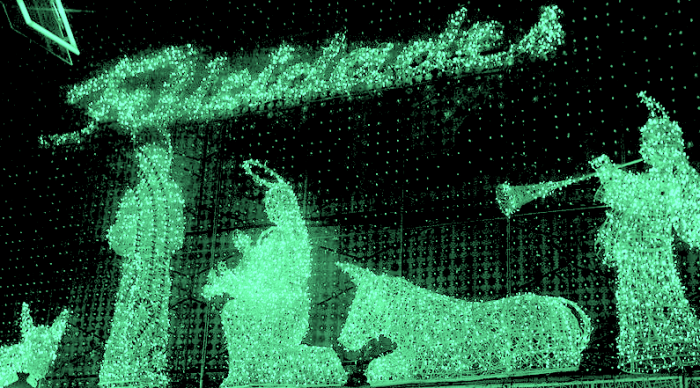So I spent the 24th of December, the Latinx Christmas, in Nashville, Tennessee. I spent it far from my family and our wonderfully-ours traditions, and since I did not feel like celebrating the 24th without a Latinx cohort, I decided to volunteer my time somewhere.
Now I am going to give you a little background on my own context. I grew up poor, from ages 0-7 years old. I grew up so poor that most people do not get to experience this level of poverty. I do not say this in the way that college kids will talk about their poverty due to improper management of their finances. I do not say this like young professionals will often talk about their finances because they are busy paying off bills, credits cards, student loans and saving all at the same time.
I say this as someone who was clinically malnourished by the time I was 5 years old. I talk about poverty as someone who grew to have certain food insecurities that I still carry with me. I am constantly worried that food will go bad, so I will often feel like I need to eat food before that happens or I recycle things like stale bread into other types of food that can be eaten later. I also do not like things like soup because soup is something that was oftentimes all we would eat. I say all this because a lot of my own survival at those times in my life had everything to do with missionary help and American doctors who came to my neighborhood to vaccinate and medicate us. I am used to people helping me and my family, and I also know that this exchange for goods came with heavy religious undertones. Like the food crates they would give to us after a prayer, or a Christian church service.
As someone who experienced what it was like to be a Third World child in need, I wholeheartedly believe that the exchange of goods for evangelization is violent. The exchange of goods for evangelization is horrible because it makes poor people susceptible to manipulation and conversion into beliefs that fall outside their own traditions—but they do it because THEY ARE STARVING.
I also maintain that those doing the evangelizing really do believe that they are doing a good deed. As far as they are concerned, they are living the truth of this world and their truth is the difference between life and death. I get evangelization through the lens of “I want to help you.” I don’t like it, but I understand that. However, goods should never be the middle of that process of evangelizing. Leave life-giving goods out of the equation! The minute you bring in these goods into the dynamic, you have taken people’s agency —poor people’s agency— and you’ve become the worst kind of human out there: because people would rather feed their starving children any day, even if it means accepting your prayer.
So I reiterate: I spent the 24th of December, the Latinx Christmas, in Nashville, Tennessee. I spent it far from my family and our wonderfully-ours traditions. Since I did not feel like celebrating the 24th without a Latinx cohort, I decided to help other people instead. I set myself up to help feed a group of homeless men at a church. I did this blindly, and I should have known better, but the minute that they asked these homeless men to bow their heads for a prayer, I knew I needed to never come back.
Right before feeding these men their dinner, they essentially were asked to leave their religious freedom at the door and to accept a God into their minds, even just for a minute.
THAT WAS A VIOLATION OF THEIR TRUST AND A VIOLATION OF THEIR VULNERABILITIES. THAT WAS EXPLOITATIVE. THAT WAS VIOLENT EVANGELISM AND I CANNOT BELIEVE THAT WE STILL DO THIS TO PEOPLE TODAY.
I think that it is the responsibility of the Church to care for the poor and the homeless. This tenant is very biblical. And programs like this enable this sort of actions from churches, but without proper training AWAY from violent evangelicalism they are doing spiritual harm to people. This should never feel like an exchange, where food is in one end alongside Christianity_and starvation and their own religious practices are at the other. This practice is bogus.
On the 24th of December, the Latinx Christmas, I decided to help other people instead. And somehow I feel like I participated in a very terrible Christian tradition of exploiting weaker people for a Christian agenda, and it made me wonder when the Church will understand the difference between helping the poor and evangelizing, because they should be understood as separate acts, and never, under any circumstances, should they ever be mixed.
***
Prisca Dorcas Mojica Rodríguez is a grassroots foreign citizen, maneuvering and resisting assimilation and respectability politics through what she calls her a chonga Mujerista ethic. She is the founder of Latina Rebels, an online platform that boasts over 150k followers. She is from Managua, Nicaragua, currently living in Nashville. Prisca has written for Philadelphia Printworks, TeleSur English, SupaDaily Latin, Huffington Post Latino Voices and other publications. Her interests are within biopolitics as it relates to Latina embodiment, specifically concerning models of conquerable flesh around narratives of naturalization for women of color. ¡Que viva la mujer!



